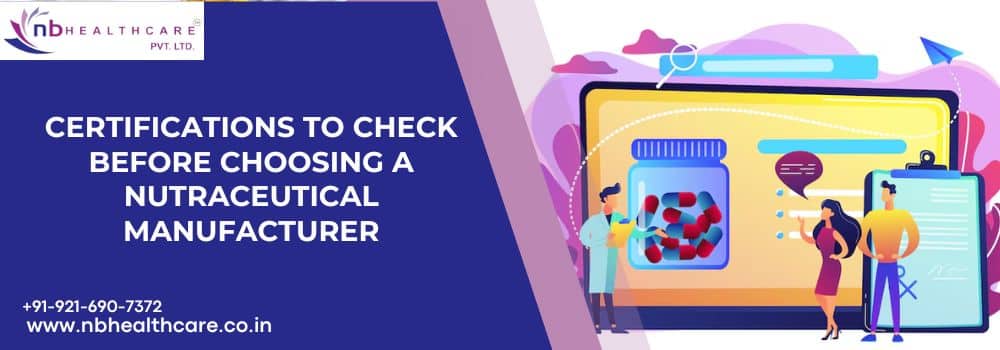Certifications to Check Before Choosing a Nutraceutical Manufacturer
By: team_admin
Latest Updated On: February 24, 2026
Lorem Ipsum is simply dummy text of the printing and typesetting industry. Lorem Ipsum has been the industry's standard dummy text ever since the 1500s, when an unknown printer took a galley of type and scrambled it to make a type specimen book. It has survived not only five centuries, but also the leap into electronic typesetting, remaining

The demand for dietary supplements, functional foods, and health products is constantly rising. It leads to an increase in the demand for nutraceutical products. Many business associates want to buy the best nutraceutical products from a well-reputed manufacturer. But not all manufacturers follow the same standards of quality and safety. Therefore, to ensure that the manufacturer you choose offers the best quality products or not, it is essential to look for the certifications that it holds. In this blog, we will discuss what Certifications to Check Before Choosing a Nutraceutical Manufacturer. Let’s start with the topic:
How to Choose the Right Certified Nutraceutical Manufacturer?
Before choosing the right certified nutraceutical manufacturer, it is essential to check its certifications. Here are some of the major certifications that a reliable nutraceutical manufacturer must hold:
1. ISO (International Organization for Standardization)
The International Organisation for Standardisation is a stamp of approval that a nutraceutical manufacturer follows all international standards. This certification defines the internationally recognised standards for quality management and food safety.
- ISO 9001: It focuses on quality management systems
- ISO 22000: This certification approves the food safety throughout the supply chain.
- ISO 14001: It ensures environmental responsibility while manufacturing products.
It is an essential certification that a nutraceutical manufacturer must have. ISO certification ensures commitment to quality, customer satisfaction, and compliance with international norms.
2. GMP (Good Manufacturing Practices) Certification
Good Manufacturing Practices certification is the foundation of the nutraceutical manufacturing company. It defines that the products are quality-assured and that the manufacturing firm follows strict standards related to hygiene, equipment, raw material sourcing, and product consistency.
- Ensures the safety and efficacy of products
- Minimises contamination risks
- Guarantees consistency in every batch
3. FSSAI (Food Safety and Standards Authority of India)
Approval from FSSAI is mandatory for all nutraceutical manufacturers. This approval ensures the manufacturer’s compliance with Indian regulations for food safety, labelling, and product formulation.
- Confirms legal authorisation to manufacture and sell nutraceuticals in India
- Protects consumers with standardised guidelines
4. USFDA (U.S. Food and Drug Administration) Compliance
U.S. Food and Drug Administration Compliance is mandatory if one wants to supply the products to international markets, especially in the USA. While nutraceutical supplements are formulated differently from pharmaceuticals, the FDA defines the trustworthiness of the firm.
- It opens opportunities for global trade
- It ensures manufacturing practices meet U.S. safety standards
5. Halal and Kosher Certifications
Not only quality and safety, but also individuals prefer those supplements that meet their religious norms. Therefore, Halal and Kosher Certifications ensure that manufacturers meet the religious norms of one or more communities of people.
- Expands product acceptance across different cultures
- Builds trust with consumers seeking specialised dietary products
Note: The Halal certification follows Sharia law and is only required if one wants to market the products to the Islamic community or nations.
6. HACCP (Hazard Analysis and Critical Control Points)
HACCP is a systematic preventive approach to food safety. It ensures that hazards are identified and controlled at every stage of manufacturing.
- Guarantees safe nutraceutical production
- Reduces risks of contamination and recalls
Conclusion
Before choosing the most reliable nutraceutical manufacturer, it is essential to look for the firm’s certifications. In the above text, we mentioned all major Certifications to Check Before Choosing a Nutraceutical Manufacturer. These certifications play a vital role in ensuring the credibility of the firm. In addition, if you have further queries than feel free to call us at +91-921-690-7372, or +91-7888-693-191.
Read More: Best Third-party Manufacturing Pharma Companies In India
Frequently Asked Questions (FAQs)
- Which certification is most important for nutraceutical manufacturers?
The most important certification for nutraceutical manufacturers is GMP (Good Manufacturing Practices). It ensures that the products are safe, consistent, and meet all strict manufacturing standards.
- Is FSSAI approval mandatory for nutraceutical manufacturers in India?
Yes, FSSAI (Food Safety and Standards Authority of India) approval is mandatory for all nutraceutical manufacturers in India. It ensures that the products meet national food safety and labelling standards.
- Do nutraceutical manufacturers need AYUSH certification?
No, AYUSH certification is not mandatory for nutraceutical manufacturers. It is required only if the products are based on Ayurvedic, Unani, Siddha, or other traditional systems. For standard nutraceuticals, only FSSAI is mandotary.
- Why are ISO certifications important for nutraceutical companies?
ISO certifications (such as ISO 9001 for quality management and ISO 22000 for food safety) define a manufacturer’s commitment to international standards, customer satisfaction, and process efficiency.
- Which certifications are required for exporting nutraceuticals?
For exporting nutraceuticals, manufacturers need various certifications such as WHO-GMP, USFDA compliance, and sometimes Halal/Kosher certifications. It depends on the target market. In addition, these certifications help in gaining global trust and regulatory clearance.







